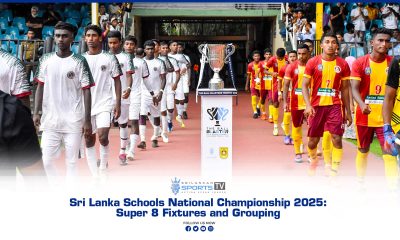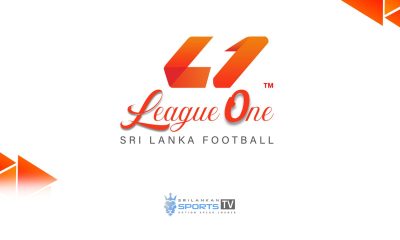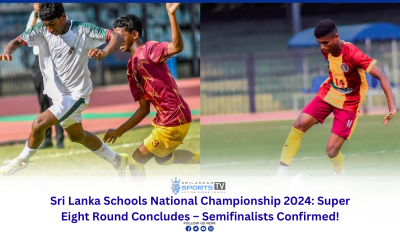News
Six countries were banned from FIFA World Cup
- Germany and Japan – 1950 World Cup
After World War II cancelled the 1942 and 1946 editions of the World Cup, the tournament resumed in 1950. But because of the outcome of World War II, Germany and Japan were not allowed to join.
Uruguay was the winner, followed by Brazil in second place, Sweden in third place and Spain in fourth place.
- South Africa – 1970 – 1990 World Cups
During apartheid in South Africa, they faced multiple international boycotts. They were suspended by FIFA in 1963 and finally expelled in 1976.
South Africa hosted the 2010 edition and is the last African country to host the tournament.
- Mexico – 1990 World Cup
FIFA slapped a two-year ban on Mexico for fielding four over-age players.
This incident happened during the qualifying round of the World Junior Championship.
The 1990 World Cup was won by West Germany, who beat Argentina in the final. Italy and England were third and fourth respectively.
- Chile – 1994 World Cup
Chilean goalkeeper Roberto Rojas pretended to be injured by a flare thrown by a fan during a 1989 match against Brazil.
In fact, he used a blade hidden in his glove to cut himself, resulting in FIFA banning Chile from the 1994 tournament. Rojas was banned for life.
- Myanmar – 2006 World Cup
In 2002, Myanmar was eliminated from a qualifying match for the World Cup in Iran.
They were fined $23,500 by FIFA and banned from the 2006 tournament in Germany.
- Russia – 2022 World Cup
After invading Ukraine, they were condemned by many countries around the world.
FIFA decided to ban the Russian football team from participating in the World Cup in Qatar.
The first match of the 2022 World Cup will begin on November 20.
FIFA ලෝක කුසලානයට ක්රීඩා කිරීම තහනම් කර ඇති රටවල් හයක්
- Germany and Japan – 1950 World Cup
දෙවන ලෝක යුද්ධය හේතුවෙන් ලෝක කුසලානයේ 1942 සහ 1946 තරගාවලි අවලංගු කිරීමෙන් පසුව, තරඟාවලිය 1950 දී නැවත ආරම්භ විය.
නමුත් දෙවන ලෝක යුද්ධයේ ප්රතිඵලය නිසා ජර්මනියට සහ ජපානයට සම්බන්ධ වීමට ඉඩ නොලැබුණි.
උරුගුවේ ජයග්රාහකයන් වූ අතර බ්රසීලය දෙවන ස්ථානයත්, ස්වීඩනය තුන්වන ස්ථානයත්, ස්පාඤ්ඤය සිව්වන ස්ථානයත් හිමිකර ගත්හ.
- South Africa – 1970 – 1990 World Cups
දකුණු අප්රිකාවේ වර්ණභේදවාදය අතරතුර, ඔවුන් බහුවිධ ජාත්යන්තර වර්ජනයන්ට මුහුණ දුන්හ. FIFA විසින් 1963 දී ඔවුන්ව අත්හිටුවන ලද අතර අවසානයේ 1976 දී නෙරපා හරින ලදී.
2010 සංස්කරණයේ සත්කාරකත්වය දැරූ දකුණු අප්රිකාව තරගාවලියේ සත්කාරකත්වය දැරූ අවසන් අප්රිකානු රට වේ.
- Mexico – 1990 World Cup
වයස් සීමාවට වඩා වැඩි ක්රීඩකයින් 4 දෙනෙකු ඉදිරිපත් කළ මෙක්සිකෝවට FIFA විසින් වසර දෙකක තහනමක් පැනවීය.
ලෝක කනිෂ්ඨ තරගාවලියේ සුදුසුකම් ලැබීමේ වටයේදී මෙම සිදුවීම සිදුව තිබේ.
1990 ලෝක කුසලානය බටහිර ජර්මනිය විසින් දිනා ගන්නා ලද අතර ඔවුන් අවසන් මහා තරගයේදී ආර්ජන්ටිනාව පරාජය කරන ලදී. ඉතාලිය සහ එංගලන්තය පිළිවෙලින් තුන්වන සහ සිව්වන ස්ථානයේ පසුවිය.
- Chile – 1994 World Cup
චිලී ගෝල රකින්නා වන රොබර්ටෝ රොජාස් 1989 දී බ්රසීලයට එරෙහිව තරගයේදී රසිකයෙක් විසින් විසි කරන ලද ගිනිදැල් නිසා තුවාල වූ බව මවා පෑවේය.
ඇත්ත වශයෙන්ම, ඔහු සිය අත්වැසුම් තුළ සැඟවුණු තලයක් භාවිතා කර තමාවම කපා ගත් අතර, එහි ප්රතිඵලයක් ලෙස FIFA 1994 තරඟාවලියෙන් චිලී කණ්ඩායමට තහනම් කළේය. රොජාස්ට ජීවිතාන්තය දක්වා තහනමක් පැනවීය.
- Myanmar – 2006 World Cup
2002 වසරේ ඉරානයේ පැවැත්වීමට නියමිතව තිබූ ලෝක කුසලාන තරගාවලියට සුදුසුකම් ලැබීමේ තරගයකින් මියන්මාරය ඉවත් විය.
ඔවුන්ට FIFA විසින් ඩොලර් 23,500 ක දඩයක් නියම කරන ලද අතර ජර්මනියේ පැවති 2006 තරඟාවලියේ තරඟාවලිය තහනම් කරන ලදී.
- Russia – 2022 World Cup
යුක්රේනය ආක්රමණය කිරීමෙන් පසු ඔවුන් ලොව පුරා බොහෝ රටවල් විසින් හෙළා දකින ලදී.
රුසියානු පාපන්දු කණ්ඩායම කටාර් ලෝක කුසලානයට සහභාගී වීම තහනම් කිරීමට FIFA තීරණය කළේය.
2022 ලෝක කුසලානයේ පළමු තරගය නොවැම්බර් 20 වැනිදා ආරම්භ වේ.
FIFA உலகக் கோப்பையில் பங்கேற்க 6 நாடுகள் தடை
- ஜெர்மனி மற்றும் ஜப்பான் – 1950 உலகக் கோப்பை
இரண்டாம் உலகப் போர் உலகக் கோப்பையின் 1942 மற்றும் 1946 பதிப்புகளை ரத்து செய்த பிறகு, போட்டி 1950 இல் மீண்டும் தொடங்கியது.
ஆனால் இரண்டாம் உலகப் போரின் விளைவாக ஜெர்மனியும் ஜப்பானும் சேர அனுமதிக்கப்படவில்லை.
உருகுவே வெற்றியீட்டியது, பிரேசில் இரண்டாவது இடத்திலும், ஸ்வீடன் மூன்றாவது இடத்திலும், ஸ்பெயின் நான்காவது இடத்திலும் உள்ளன.
- தென்னாப்பிரிக்கா – 1970 – 1990 உலகக் கோப்பைகள்
தென்னாப்பிரிக்காவில் நிறவெறியின் போது, அவர்கள் பல சர்வதேச புறக்கணிப்புகளை எதிர்கொண்டனர். அவர்கள் 1963 இல் FIFA ஆல் இடைநீக்கம் செய்யப்பட்டனர் மற்றும் இறுதியாக 1976 இல் வெளியேற்றப்பட்டனர்.
2010 பதிப்பை நடத்திய தென்னாப்பிரிக்கா, போட்டியை நடத்தும் கடைசி ஆப்பிரிக்க நாடு.
- மெக்சிகோ – 1990 உலகக் கோப்பை
வயதுக்கு மேற்பட்ட நான்கு வீரர்களை களமிறக்கியதற்காக மெக்சிகோவுக்கு ஃபிஃபா இரண்டு ஆண்டு தடை விதித்தது.
உலக ஜூனியர் சாம்பியன்ஷிப் போட்டியின் தகுதிச் சுற்றின் போது இந்த சம்பவம் நடந்துள்ளது.
1990 உலகக் கோப்பையை இறுதிப் போட்டியில் அர்ஜென்டினாவை வீழ்த்தி மேற்கு ஜெர்மனி வென்றது. இத்தாலி மற்றும் இங்கிலாந்து முறையே மூன்றாவது மற்றும் நான்காவது இடத்தில் உள்ளன.
- சிலி – 1994 உலகக் கோப்பை
சிலி கோல்கீப்பர் ராபர்டோ ரோஜாஸ் 1989 ஆம் ஆண்டு பிரேசிலுக்கு எதிரான போட்டியின் போது ஒரு ரசிகரால் வீசப்பட்ட ஃப்ளேயால் காயம் அடைந்தது போல் நடித்தார்.
உண்மையில், அவர் தனது கையுறையில் மறைத்து வைத்திருந்த பிளேடைப் பயன்படுத்தி தன்னைத் தானே வெட்டிக்கொண்டார், இதன் விளைவாக ஃபிஃபா 1994 போட்டியில் சிலியை தடை செய்தது. ரோஜாஸ்க்கு வாழ்நாள் தடை விதிக்கப்பட்டது.
- மியான்மர் – 2006 உலகக் கோப்பை
2002 இல், ஈரானில் நடைபெறவிருந்த உலகக் கோப்பைக்கான தகுதிச் சுற்றில் இருந்து மியான்மர் வெளியேறியது.
அவர்களுக்கு FIFA $23,500 அபராதம் விதித்தது மற்றும் ஜெர்மனியில் 2006 போட்டியில் இருந்து தடை செய்யப்பட்டது.
- ரஷ்யா – 2022 உலகக் கோப்பை
உக்ரைனை ஆக்கிரமித்த பிறகு, அவர்கள் உலகின் பல நாடுகளால் கண்டனம் செய்யப்பட்டனர்.
கத்தாரில் நடைபெறும் உலகக் கோப்பை கால்பந்து போட்டியில் ரஷ்ய கால்பந்து அணி பங்கேற்க தடை விதிக்க ஃபிஃபா முடிவு செய்துள்ளது.
2022 உலகக் கோப்பையின் முதல் போட்டி நவம்பர் 20 ஆம் தேதி தொடங்குகிறது.
News
Sri Lanka Set to Face UAE in Crucial Rugby Clash Tomorrow in Colombo
The Sri Lanka national rugby team will lock horns with the United Arab Emirates (UAE) in a much-anticipated international rugby encounter set to take place today (July 4) at the iconic Racecourse Ground, Colombo.
As part of their final preparations, the Sri Lankan team held an intensive training session today under the watchful eyes of the coaching staff. The team looked sharp, focused, and ready to bring their A-game to home soil.
This clash promises to be a key test for the Tuskers as they look to strengthen their footing in the regional rugby scene and gain momentum ahead of upcoming international competitions. UAE, a rising force in Asian rugby, will also be eyeing a big performance away from home.
Both teams are expected to field strong lineups, and the match is anticipated to draw significant interest from local fans eager to witness top-tier rugby action.
📍 Match Info
🗓️ Date: July 4, 2025
📍 Venue: Racecourse Rugby Grounds, Colombo
🕒 Kick-off: TBA
Stay tuned for live updates, photos, and post-match coverage on Sri Lankan Sports TV.
Football
Sri Lanka Women Crushed 8-0 by Nepal in AFC Qualifiers – Tactical Collapse Raises Alarm
Colombo, July 2 – Sri Lanka Women’s National Football Team suffered another brutal defeat in the AFC Women’s Asian Cup 2026 Qualifiers, going down 8-0 to a confident and clinical Nepalese side. Coming just days after a 10-0 hammering by Uzbekistan, this latest loss highlights deeper tactical, technical, and structural issues within Sri Lanka’s women’s football system.
Full-Time Score: Sri Lanka 0 – 8 Nepal
Half-Time: 0 – 4
Venue: Group F – AFC Women’s Asian Cup 2026 Qualifiers
Key Match Statistics
| Stat | Sri Lanka Women | Nepal Women |
|---|---|---|
| Possession | 50% | 50% |
| Total Shots | 4 | 26 |
| Shots on Target | 3 | 18 |
| Shots off Target | 1 | 8 |
| Expected Goals (xG) | 0.60 | 3.76 |
| Corners | 0 | 14 |
| Fouls | 4 | 6 |
| Cards | 0 | 0 |
| Offsides | 0 | 3 |
Tactical Breakdown – Why Sri Lanka Lost 8-0
Despite the possession being even at 50%, Sri Lanka was thoroughly outplayed. This is a classic case where possession stats mislead the reality on the pitch.
1. Poor Defensive Organization
- Sri Lanka conceded 14 corners and 18 shots on target, indicating that Nepal constantly penetrated both flanks and delivered into the box unchallenged.
- There was no compact defensive line, and Nepal exploited space behind Sri Lanka’s fullbacks repeatedly.
2. Ineffective Midfield Structure
- While Sri Lanka held possession equally, it was largely passive and in non-threatening zones.
- Nepal, on the other hand, converted their possession into 3.76 xG, showing how effective and vertical their transitions were.
3. Repeated Failures in Closing Down Key Players
- Sabitra Bhandari scored a hat-trick within 26 minutes (14’, 36’, 40’) and was left unmarked multiple times.
- Nepal’s attackers were given space and time to shoot – evident from the 18 shots on target.
4. No Offensive Threat
- Sri Lanka managed only 4 shots in the entire game, with an xG of just 0.60.
- With no corners and no real pressing, the team offered nothing going forward, allowing Nepal to push numbers up comfortably.
Back-to-Back Heavy Losses: Structural Failures Exposed
This defeat comes after a 10-0 loss to Uzbekistan, meaning Sri Lanka has now conceded 18 goals in two matches without scoring once.
This isn’t just a reflection of players’ on-field performance — it’s a glaring indictment of:
- FFSL’s failure to conduct any women’s football league in years
- A rushed team selection based on a short trial, without competitive match practice
- No structured coaching program or international exposure
- Lack of scouting, fitness programs, and tactical planning
Nepal, though not an Asian powerhouse, had better coaching structure, player chemistry, and clear tactics, which led to their dominance.
What’s Next for Sri Lanka?
If the Football Federation of Sri Lanka (FFSL) and the Ministry of Sports continue to ignore these warning signs, Sri Lanka risks becoming irrelevant in women’s football on the Asian stage.
What’s needed:
- ✅ A proper national women’s league
- ✅ Regular youth-level competitions and scouting
- ✅ Appointing qualified coaching staff with modern tactical knowledge
- ✅ Consistent international exposure for players
Conclusion
An 8-0 defeat to Nepal isn’t just a bad result — it’s a mirror held up to a broken system. Unless real change is implemented beyond symbolic participation, these results will become Sri Lanka’s norm in women’s football.
News
Top International Referees to Officiate High-Profile Dialog Schools Rugby Matches in Sri Lanka
Colombo – In a significant boost for school-level rugby in Sri Lanka, two internationally renowned referees from Hong Kong have been appointed to officiate key Dialog Schools A Division Rugby League matches this weekend.
Sunny Lee to Referee Pathana–Thomian Clash
Sunny Lee, a celebrated female international rugby referee from Hong Kong, will take charge of the much-anticipated encounter between S. Thomas’ College, Mount Lavinia and Isipathana College, Colombo. The prestigious Rizvy Suhayb Memorial Trophy match is set for July 5 at S. Thomas’ College Grounds, Mount Lavinia.
Lee’s presence is expected to bring elite-level officiating standards to this traditional rivalry, enhancing the competitive environment and offering student-athletes a platform to perform under world-class match management.
Francisco Cammisa to Oversee Trinity vs Royal Clash
On the same day in Kandy, another experienced Hong Kong referee, Francisco Cammisa, will officiate the top-tier fixture between Trinity College, Kandy and Royal College, Colombo at the Pallekele Rugby Stadium.
International Support for Local Rugby
The arrival of these elite foreign referees is made possible through the efforts of Dilroy Fernando, former international referee and referee educator. With backing from Asian Rugby (covering airfares) and the host schools (providing accommodation and hospitality), this initiative aims to uplift officiating standards and offer young Sri Lankan players the opportunity to compete at a globally recognized level.
Long-Term Impact on School Rugby
This strategic move is expected to:
- Enhance the quality and fairness of officiating in the Dialog Schools Rugby League
- Give emerging players exposure to world-class rugby conditions
- Strengthen partnerships between Sri Lankan rugby institutions and international bodies
The involvement of international referees like Sunny Lee and Francisco Cammisa also sends a strong message about gender inclusivity and professional standards in the sport
-

 Live4 years ago
Live4 years agoLive Broadcast of Syria vs Sri Lanka | AFC U23 Asian Championship Qualification
-

 Football5 months ago
Football5 months agoSri Lanka Schools National Championship 2025: Super 8 Fixtures and Grouping
-

 Cricket1 month ago
Cricket1 month agoNuwan Thushara Shines as RCB Storms into IPL 2025 Final
-

 News5 months ago
News5 months ago2025 Schools Rugby Season Set to Thrill Fans with Knockout and League Action
-

 Football6 months ago
Football6 months agoFFSL Rebrands Division-1 as ‘League-One’ with a Bold New Vision
-

 Football4 months ago
Football4 months agoSri Lanka Schools National Championship 2024: Super Eight Round Concludes – Semifinalists Confirmed!
-

 News4 years ago
News4 years agoWe are Back
-

 Football6 months ago
Football6 months agoErling Haaland Signs Record-Breaking 9.5-Year Contract Extension with Manchester City





